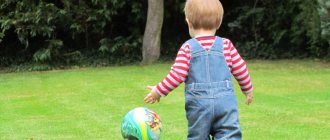Most often, healthy children pronounce their first words at about one year of age. If this does not happen, many parents begin to sound the alarm. However, experts in the field of early development have concluded that the initiation of speech is an individual process for which there is no clear age period. Studies of speech development show that the appearance of speech in a child depends both on the maturation of certain parts of the brain and on the environment in which the child grows. Knowing the characteristics of their child, parents can create a favorable environment for him and help overcome difficulties in the development of your baby's speech.
Speech development at an early age
Sometimes we mistake baby talk for “real” words. A child under one year old tries to repeat the speech of an adult in his own language, often understandable only to his mother. Already a six-month-old baby uses gestures and individual sounds to indicate his needs. Also at this age, the child learns to combine vowels and consonants when pronouncing syllables.
The process of speech development itself is not systematic in children of early and preschool age; very often one can observe leaps in speech development. All children begin to speak at different times. By the age of one year, some children can already pronounce up to 15 separate words. And according to the calculations of child psychologist S. Buller, by the age of 1.5 years, a child’s vocabulary can reach 232 words. At the same time, there are healthy children who at the age of two do not speak a word. Such “silent people” can suddenly begin to speak in whole phrases, catching up and ahead of their peers.
To get a silent child to talk and stimulate the development of his speech, you need to voice your actions, encourage dialogue with the help of questions, listen with interest and try to understand the baby’s answers. Then you will certainly hear that cherished first word.
Correct development of speech functions in a child
21.02.2020
Timely and correct development of speech functions in a child is an important stage in life. His success in communicating with others and the development of his intellect depend on how competently and fully a child speaks
Child speech development
The formation of a child’s speech is based on several factors:
- constant communication with the baby;
- touch, sensation, visual and auditory perception of the surrounding world;
- movement (general activity and development of motor skills ).
The baby’s speech development begins already at 2-3 months, when he pronounces various sounds - aha, uh-huh, etc.
At 5 months, the child begins to imitate adults, watching how they move their lips and pronounce sounds .
At 8-9 months, the baby already pronounces syllables, you can hear babbling and singing, which has a beneficial effect on the development of the voice.
At the age of 1 year, the child learns some vowels and consonants, the vocabulary contains from 5 to 10 words, and gestures are actively used in communication.
At 1.5 years, vocabulary increases to 45 words. At this age, it is necessary to develop in the child the ability to correlate a word with an action, stimulate the desire to ask for something himself, and start a conversation with him.
By the age of two, a child can already pronounce simple sentences and speak his or her language for a long time. He shows objects, toys and body parts that the adult asks about. Even when the baby misses some letters or adds extra ones, this is not scary, and is also not a pathology.
Formation of correct speech
Sometimes, even with normal development, a child has difficulty mastering speech . In such cases, the child needs help. And it is not necessary to immediately contact specialists. Parents can handle this task themselves.
Problems with pronunciation may occur due to problems with dental . Therefore, it is necessary to monitor the condition of the dental cavity and promptly contact a dentist .
Hearing also plays an important role in the formation of speech in a child. Even with the slightest violations in children, the quality of development of correct speech . To avoid this, parents should not put too much stress on hearing , do not play loud music, and consult a doctor in case of ear diseases.
Children very often imitate adults in pronunciation. Therefore, those around you need to monitor the correctness of their speech , pronounce all words clearly and slowly and not fake their communication as childish speech .
You cannot scold a child for his poor pronunciation of some words. In this case, he will simply withdraw into himself and will not make contact. You need to correct the child patiently and lovingly, pronouncing the word correctly.
First words
The time when the baby says his first word depends on his environment and the communication of his family with him. This usually occurs within 1 to 2 years. And, as a rule, the first words consist of repeated syllables: mom, dad, baba, etc.
An interesting fact is that children under 2 years of age speak only about what is within their sight, since the first words of children are necessarily associated with certain actions or objects.
At the next stage, pronouns are pronounced: here, there, etc. Thus, the baby matches the object with its location.
Very often, after this stage, verbs begin to appear in pronunciation. And this is a great success in the development speech , since it is already possible to gradually compose a dialogue.
Parents should create such an atmosphere in the family for the child so that it is always interesting and pleasant for him to communicate with loved ones, learn new information and increase his vocabulary. This will be the key to competent communication with others and the development of the child’s intelligence.
Published in Defectology Premium Clinic
Stages of child speech development
As we have already said, the trajectories of speech development are individual for each child, and therefore psychologists and other specialists in the field of early development do not establish clear standards for speech development in children.
It is important to note that an indicator of speech development is not only the number of sounds and words that a child uses to communicate, but also his passive vocabulary, that is, those words that the child understands. The passive vocabulary is always larger than the active one, so if the child does not speak, but understands your speech, there is most likely no reason to worry.
Speech skills characteristic of the conditional norm in early and junior preschool age are presented in the table.
| Age | Speech development |
| 1-3 months | Scream. |
| 3-6 months | Humming – drawn-out sounds (“a-gu”, “a-gy”, “bu-u”, etc.). |
| 4-5 months | Squealing, laughter. Humming in various intonations. |
| 6 months | Babbling (syllables “ma”, “ba”). |
| 7-8 months | Increasing the number of pronounced sounds, onomatopoeia (“woof-woof”, “pee-pee”), understanding simple words and requests. |
| 9-11 months | Simple words (“mother”, “baba”, “give”, “na”). |
| 1–1.5 years | Simple two-word phrases (“give yum-yum”, “there’s a pussy there”). |
| 2-3 years | Phrases of 2-3 words, the appearance of question words. Naming famous colors, objects, body parts. Learning simple poems, telling short stories. |
| 34 years | Phrases of 4 or more words. A stranger can understand a child’s speech. |
If there is a strong discrepancy between the child’s speech development level and age norms, it is advisable to seek advice from a specialist (neurologist, speech therapist, psychologist) in order to exclude a delay in psycho-speech development.
Symptoms of delayed speech or mental development of a child may include the following:
- Problems with chewing and swallowing food;
- Constantly open mouth, excessive salivation;
- Refusal to communicate;
- Lack of eye contact;
- Slurred speech, “porridge in the mouth”;
- Difficulties in understanding speech (does not respond to requests);
- Inappropriate behavior.
Timely contact with specialists allows you to identify the cause of the child’s delayed speech development as early as possible and develop an individual plan for correctional and developmental classes.
Causes of delayed mental speech development of a child
There are many factors that can trigger the disease. They can be divided into groups:
- Intrauterine development. Hypoxia, fetal infections. Its development after birth is influenced by illnesses and injuries that the mother suffered during pregnancy.
- Complicated childbirth. Traumatic, premature or rapid birth, entanglement.
- Diseases in the first year of life. Neuroinfections, brain injuries.
- Genetic factors. Chromosomal abnormalities and heredity - the disease tends to worsen in the next generation.
Delayed mental speech development of a child may occur against the background of diseases that disrupt the functioning of the brain. These include: congenital diseases of the central nervous system, epilepsy, hydrocephalus, cerebral palsy, brain tumors, disorders of the outflow of cerebrospinal fluid.
As a rule, parents learn about the situations listed above - congenital disorders, primary diseases and injuries - immediately and provide assistance to their child - they undergo treatment and rehabilitation courses.
But there are situations when a child is born physically and mentally healthy, grows and develops in accordance with age norms. And then suddenly he is diagnosed with SPD. Social factors can contribute to this : overprotection or, conversely, cruelty, violence or indifference towards the child, severe psychological trauma, unfavorable psychological climate in the family.
First word
What should a baby's first word be? Early development specialists believe that it does not necessarily have to be familiar and familiar to us. Experts tend to consider any recognizable set of sounds that denote a person, object or action (for example, “baka” instead of “dog”, “ka” instead of “porridge”) as a peculiar word.
Usually children say their first word at the age of 8-9 months. Most often these are onomatopoeias or words of two repeated syllables.
How to understand that a child said exactly a word, and not just a set of sounds? If the child’s statements are repeated under the same circumstances, even if you cannot understand them, rest assured that your baby said a word, his speech apparatus is simply not yet developed enough to pronounce this word legibly. To prevent your child’s speech development from slowing down, you should not speak to your baby in his “baby” language. If your child says “beep beep” while pointing at a car, say, “That’s right, it’s a car.” While walking in the yard, ask your child to show you the car. And to translate the word “car” from a child’s passive vocabulary to an active one, point to the car and ask: “What is that?” Then your baby will certainly learn a new word and learn to pronounce it correctly.
There is a myth that a child’s first word must be the word “mother.” Indeed, some children say “mom” as early as 4-5 months. Also, even before one year old, children can say “Lala”, “Baba”, etc. These are all easy-to-pronounce words that are formed from the repeated babble of a child. The words that are easy to pronounce come first.
When to see a speech therapist
You should contact a speech therapist if:
• up to 2.5 years the child has not developed speech or the child’s vocabulary is no more than 10 words. A qualified speech therapist can not only correct sound pronunciation, but also stimulate the appearance of speech in non-speaking children;
• a child of 1.5 - 2.5 years old does not utter normal, understandable words like “mother”, “woman”, “bi-bi”, “cat”, “drink”, “go”, but speaks in his own language language, and a lot and actively (no need to wait 3 years - go to a speech therapist right now);
• a child of 4 – 5 years old softens all sounds: “kisya”, “shchapka”, “taynik”, “lampotka”;
• a child 3 years of age and older distorts the syllabic structure of a word, skips, rearranges syllables, adds new ones: “puvitsa” - “button”, “gebimot” - “hippopotamus”, “pepitan” - “captain”;
• the child is over 6 years old and does not pronounce any sounds of his native language. At this time, the phonetic system is fully formed, and the baby should speak correctly;
• the child began to repeat the first sounds, syllables, words (speech hesitations appeared).
You should also be more careful if your child is learning several foreign languages at once: sometimes in such cases he may develop dysgraphia, a disorder in mastering written language. To avoid deviations, you need to work with your child as soon as he becomes familiar with letters - usually this skill comes at 4 - 6 years old.
First phrases
An important stage in speech development is the acquisition of phrasal speech in preschool age. By the age of 1.5–2 years, simple two-word phrases usually appear in speech. The vocabulary is actively increasing, verbs, prepositions, and adverbs are being used. At 2-3 years old, children begin to use adjectives. The age of 3-5 years is often called the age of “why”. During this period, children are interested in everything, eagerly learn about the world around them and, accordingly, ask adults many questions.
If at this age the child does not have phrasal speech, you should consult a specialist. Developmental activities will help fill in the gaps and lay the foundation for the further development of your baby’s speech.
To develop your child’s phrasal speech, you can do the following:
- Read books to your child that are appropriate for his age;
- Look at the pictures;
- Listen to music with your child, sing songs, dance;
- Answer the child’s questions and support his research interest;
- Provide the child with new impressions, discuss what he sees;
- Monitor the purity of your own speech;
- Encourage communication with children.
There are also a number of games and exercises that contribute to the development of a child’s speech. These include:
- Games to develop fine motor skills;
- Articulation gymnastics;
- Finger gymnastics.
You can get acquainted with these and many other useful exercises in classes at. The good thing about these games is that you can play them at home yourself. They not only have a beneficial effect on speech development, but also develop the baby’s attention, memory, and thinking. Perform only those exercises that evoke positive emotions in you and your child, do it unobtrusively and with genuine interest. The most important thing is to enjoy communicating with each other.
Development of coherent speech in children 7-8 years old
Development of coherent speech in children 7-8 years old
Author: Loginova Olga Sergeevna, teacher-speech therapist MBOU “Secondary School No. 9”, Cheboksary, Chuvash Republic
Coherent speech is not just a sequence of interconnected thoughts that are expressed in precise words in correctly constructed sentences... Coherent speech, as it were, absorbs all the child’s achievements in mastering his native language, in mastering its sound side, vocabulary and grammatical structure. F. Sokhin
A wonderful time of childhood! A child who crosses the threshold of school for the first time finds himself in the world of human knowledge, where he has to discover a lot of unknowns and look for original, non-standard solutions in various types of activities. Such activity is creative, cognitive activity. It is based on the implementation and development of the child’s cognitive interests, methods and capabilities.
A person’s speech is a kind of mirror of culture and education. From speech, you can immediately determine the level of thinking of the speaker, as well as the level of his development.
By developing a child's speech, we develop his intellect. Only through the development of speech is it possible to develop and improve thinking, imagination, ideas, and higher emotions. Therefore, speech development is carried out in literacy, reading, and grammar lessons. It is inseparable from any language work.
Language education and speech development of primary schoolchildren is one of the central problems in modern primary schools. Studying the Russian language is focused on solving such pressing problems as linguistic, emotional, moral and intellectual development.
Recently, special importance has been attached to the communicative education of schoolchildren, since success in speech development determines the effectiveness of mastering other school disciplines, creates the prerequisites for active and meaningful participation in public life, and provides children with the speech behavior skills and culture of speech development necessary in their personal lives.
At the age of six, a child has almost completely completed the development of sound speech. The development of speech in primary schoolchildren is such that children can use simple and complex sentences, use the grammatical forms of their native language, and master all phonemes.
The written speech of younger schoolchildren during their studies in primary school is constantly improved, the child significantly expands his vocabulary. By communicating with teachers and parents, the child not only quantitatively expands his vocabulary, he clarifies the meaning of all the words he has learned, i.e. expands it qualitatively.
The coherent speech of younger schoolchildren can be improved in the form of play, because it is known that this form is the best for six-year-olds to master knowledge - the education of younger schoolchildren is based on play. You can improve children's speech using a variety of entertainment scenarios - during entertainment and competitions, schoolchildren make maximum use of their own speech during free speech communication. That is why it is necessary to fully prepare your child for school, packing a backpack and pencil case with colorful filling. It is important that all elements set the child up for a playful form of learning. Here is an example of colorful backpacks that your kids will definitely like: https://vsova.ru/catalog/shkolnie-ranzy-i-rukzaki/
But not all children have developed their speech before entering school. Speech impairment in younger schoolchildren can be caused not only by problems of a speech therapy nature - children at this age tend to copy the people around them who, intentionally or due to illiteracy, pronounce words incorrectly. Children are very prone to imitation, so you can often hear them say “hoo” or “don’t touch”, so teachers in primary grades set the goal of instilling in schoolchildren a love for the correct use of words.
In recent years, I began to notice that first-graders increasingly have an insufficiently developed ability to express their thoughts coherently and consistently: although they own a set of words and syntactic structures necessary to construct a statement, they experience significant difficulties in understanding any phrases, in connecting individual elements into a whole, in the selection of material that would correspond to one or another purpose of the statement. Other students, having relatively well-formed coherent speech, are unable to reflect various subject relations in their own speech due to the poverty of linguistic means, namely: insufficient vocabulary, few adjectives, adverbs, antonyms, synonyms, adverbs, prepositions are used in speech.
In my speech therapy classes, I try to pay as much attention as possible to compiling a story based on questions, subject, plot pictures, a series of pictures, graphic (symbolic) diagrams, reference words, verbally programming detailed messages, practicing the ability to reflect cause-and-effect relationships between facts of reality. The most important lexical skill developed in speech therapy classes is the child’s ability to independently notice unfamiliar words and try to find out and explain their meanings.
I hope the selected exercises will be useful to you, and you will be interested in what tasks, games and exercises can be done at home in order to develop coherent speech in your child as best as possible.
The first group of exercises aimed at accuracy, logic and communicative expediency, linguistic correctness:
- Compose a text about a cat based on a drawing or tell about your cat (orally).
- Make two sentences from the words.
I, on the tree, saw, hammered, a woodpecker, with a strong beak, he, an aspen.
- Make a sentence out of words and write it, dictating to yourself syllable by syllable.
In spring, sparrows swim in puddles.
Make up another sentence about sparrows to make a text. Write it down.
- Read it. Make two sentences from the words.
Goats and sheep were grazing in the meadow; they were nibbling grass.
Make up a story based on the pictures. What will you title it? Why?
- Look at the drawing. Title it. Tell me what happened in the forest.
The second group of exercises aimed at expressiveness, content, and clarity of speech includes the following exercises:
- Read the text.
Girlfriends
Olya was often sick. And her school friend Lena grew up agile and strong. The girls thought: why is this? Lena starts every day with exercise. In winter he skis and skates. Lena decided to help Olga become strong.
Prepare a continuation of the text about how Lena will help Olya. Write two sentences.
- Read the beginning of the fairy tale.
In a fairy-tale city there lived a puppet master. He made wonderful toys. One day I came to the master...
Come up with a continuation of the fairy tale.
Thus, before developing coherent speech, it is necessary to use various techniques and methods aimed at developing coherent speech in primary schoolchildren. And this requires painstaking work by students, teachers and parents. Only systematic, joint work of all of us will definitely lead to success!
| Tweet |
| Like |
conclusions
Speech development is a complex process, and it occurs differently for each child. Experts identify several stages of speech development in children, each of which involves the development of new speech skills. These stages do not have strict age limits. The transition from one stage of speech development to another can occur either smoothly or abruptly.
If the baby is healthy, speech development occurs naturally when you communicate with him and talk about the world around him. Your child watches you and tries to copy your speech, so it is important to monitor the correctness of your own speech. It is necessary to create a favorable environment for the child in which he can fulfill the needs characteristic of his age. You can offer your child games to develop fine motor skills, as well as introduce them to articulation and finger gymnastics.
If you feel that your baby is experiencing difficulties and the development of his speech is far behind the conventional boundaries of the norm, you need to consult with a specialist to rule out health problems and delayed psycho-speech development.
The role of parents in the treatment of SPD
Without the participation of mom and dad, even the best specialist will not be able to cure their child. Their task is to follow all doctors’ recommendations. For example, doing exercises at home to develop fine and gross motor skills, playing outdoor games, listening to and guessing musical instruments, putting together puzzles, constantly talking to the child - only with such comprehensive work of doctors and parents can he be helped.
Another important point. Do not replace verbal communication with TV and smartphone. The speech your child hears on TV or from cartoons interferes with the formation of his own speech. His passive vocabulary will be good, but his active vocabulary will not. “Mechanical” voices activate the right hemisphere when the left hemisphere is responsible for speech formation. Thus, gadgets inhibit speech development and provoke mental retardation, which, in turn, can lead to a delay in the mental development of speech. Therefore, it is better not to turn on the TV, radio, tablets and other devices at all in front of your child.
Spend more time with your son or daughter, go out into nature - this helps improve your psycho-emotional state.









